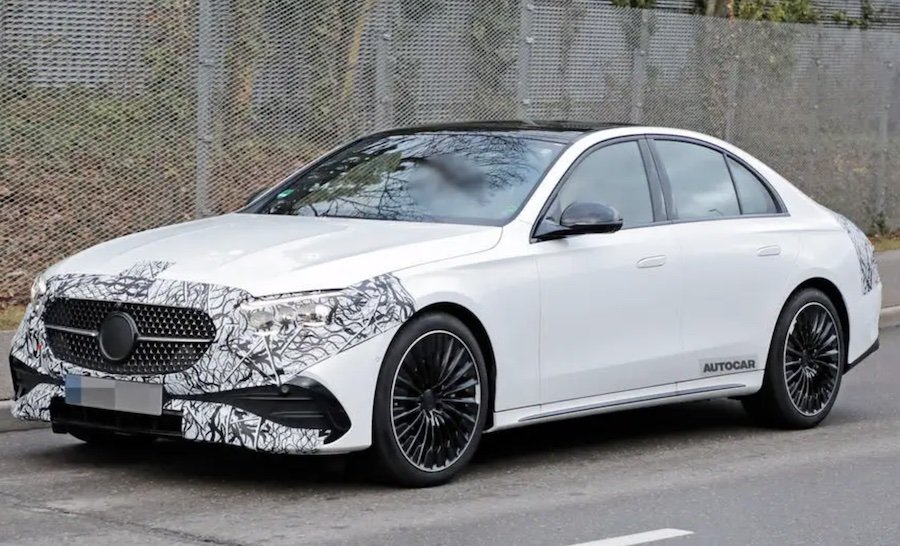The next Mercedes-AMG E63 is set to swap its V8 petrol engine for an advanced new straight-six plug-in hybrid drivetrain, providing it with greater power and the capacity for electric-only driving.
Set to be unveiled in 2024, the hot saloon/estate will be the first in a series of Mercedes-AMG models to adopt the new electrified drivetrain, which uses a similar ‘P3’ hybrid arrangement to the recently launched Mercedes-AMG GT 63 S E Performance 4-Door Coupé and Mercedes-AMG C63 S E Performance.
Official details remain under wraps, but Autocar can confirm the hottest version of the next Mercedes-Benz E-Class will receive a heavily reworked version of Mercedes' M256 turbocharged 3.0-litre straight-six petrol engine, mounted longitudinally and working in tandem with an electric motor on the rear axle.
The extent of the modifications made to the M256 by AMG remains unclear. However, it appears set to share a number of key components with the M139L and M177 engines used by the C63 and GT 63, with a similar in-line design and internal dimensions, including an 83mm bore measurement and 90mm bore centre spacing.
The asynchronous motor set to feature in the new E63 is also similar in construction and performance to the 201bhp unit used by the other electrified '63’ models, according to insiders at Affalterbach.
Electrical energy is stored in a 4.8kWh (usable) 400V lithium ion battery mounted under the boot floor.
AMG is claimed to be targeting an output of more than 700bhp and 884lb ft for the new drivetrain. For context, the four-cylinder system in the C63 delivers 671bhp and 752lb ft of torque, while the V8 system in the GT 63 kicks out 831bhp and 1031lb ft.
By comparison, the M177 twin-turbocharged 4.0-litre V8 petrol engine that powers the existing E63 S develops 604bhp and 626lb ft of torque.
The secret to the significant increase in power and torque with the new plug-in hybrid systems is the fact that the output isn't limited by the gearbox, because the reserves from the motor are sent directly to the rear wheels via a two-speed gearbox and an electronically controlled limited-slip differential.
The straight-six engine channels its reserves to both the front and rear wheels via AMG’s nine-speed Speedshift MCT gearbox.
As with its PHEV stablemates, the new E63 is set to receive seven different AMG Dynamic Select driving modes: Electric, Comfort, Battery Hold, Sport, Sport+, Slippery and Individual.
With increased power and torque, AMG will be looking to top the performance of the existing E63 S (which is claimed to hit 62mph from rest in 3.4sec and reach a top speed of 186mph when fitted with the optional AMG Driver’s Package), despite a significant increase in weight brought on by the motor and battery.
With the new PHEV system conceived more for performance than outright efficiency, the electric-only range will be limited. That of the C63 is officially rated at just 8.0 miles and that of the GT 63 at 7.5 miles.
Both models use the same 4.8kWh battery developed by AMG in partnership with its High Performance Powertrains division based in Brixworth, Northamptonshire, and claimed to weigh 89kg.
In line with developments brought to other plug-in hybrid AMG models, including the more recently launched S63 S E Performance, AMG plans to provide the new E63 with four levels of energy regeneration.
Underpinning the new car will be a revised version of Mercedes' Modular Rear Architecture (MRA) with double-wishbone front and multi-link rear suspension and, for the first time on the E-Class flagship, four-wheel steering.
The E63 is one of two new E-Class models planned by AMG. The other, a successor model to today’s E53, is set to run a milder version of the M256 engine in combination with a gearbox-mounted electric motor, in what insiders describe as a 'P2' PHEV system.
Essentially the same system used by the S580e, it delivers an overall system output of 510bhp and 553lb ft of torque.
This compares with the 429bhp and 383lb ft of today’s E53, which uses a mild-hybrid version of the M256 that gets an additional 22bhp and 184lb ft from a gearbox-mounted integrated starter-generator (ISG) for brief periods under acceleration.
Related News

